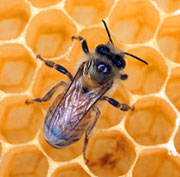
| Insect and Bee Populations Decline | 29 April 08 |
 Research into the unprecedented decline of insects and bee populations has been linked to pollution and mobile phones. Bees and insects are an essential agent of pollination for plants. Without them agriculture would be impossible. Research into the unprecedented decline of insects and bee populations has been linked to pollution and mobile phones. Bees and insects are an essential agent of pollination for plants. Without them agriculture would be impossible.Research funded by the US National Science Foundation found that ozone and nitrate radicals from car exhausts are dulling floral aromas and disrupting insect life. Scent molecules are volatile and quickly bond with pollutants, chemically altering them to no longer smell like flowers. "Scent molecules produced by flowers in a less polluted environment travel for roughly 1,000 to 1,200 metres. But today they may travel only 200 to 300 metres. This makes it increasingly difficult for bees and other insects to locate flowers," said Professor Jose Fuentes, who led the study. Honey bee populations are declining rapidly in the United States, Britain and across much of the globe. 2.5 million honey bee colonies in America have been lost to Colony Collapse Disorder (CCD). Albert Einstein once said that if the bees disappeared, "man would have only four years of life left". According to the British Beekeepers' Association (BBKA) honey bees could disappear completely from Britain by 2018. View April 20, 2008 Common Dreams article View April 20, 2008 Daily Mail article View April 11, 2008 Science Daily article View April 23, 2008 The Independent article View March 1, 2008 The Independent article Sources: Common Dreams, Daily Mail, Science Daily, The Independent |
|
 Print version Print version |
Top |
